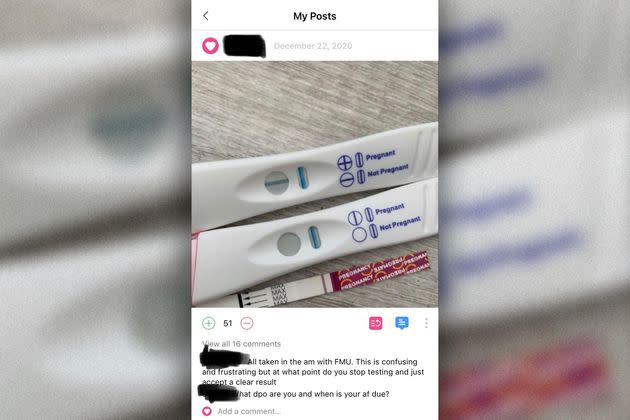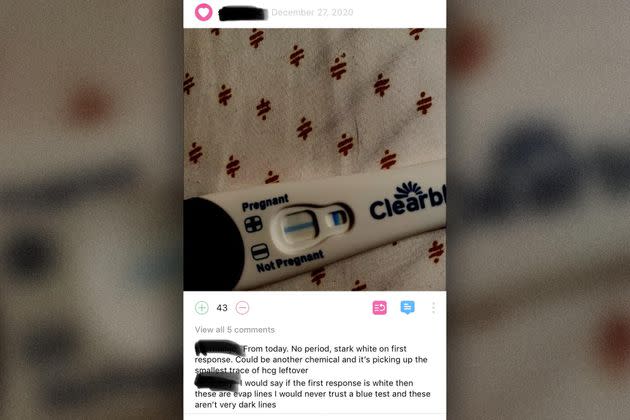My Miscarriage Left Me Heartbroken. An Anonymous Group Got Me Through — And I've Still Never Met Them.

One of the author's posts on the app.
I bought the 40-count bag of Pregmate pregnancy test strips on Amazon. The Babycenter community boards, where getting pregnant is a hot topic of discussion, said to use FMU (first morning urine) because it’s undiluted, so I always took a test when I woke up. But inevitably, I drank water and ate breakfast, and tested again.
Sometimes I tested three times a day, lining up the inch-long sticks on my desk and comparing the results. I held them under my desk lamp and shined my phone’s flashlight on them. And when I stopped trusting my own eyes, I took pictures of the tests and posted them on the Pregnancy Test Checker app.
Pregnancy tests are marketed as easy to read, but for self-proclaimed POAS (pee on a stick) addicts, like I once was, there’s a name for when you lose the ability to accurately read a pregnancy test: It’s called “line eyes.” It happens when you’ve been staring at plastic sticks so long, you start to see positive results on every test.
I can’t recall anymore how I even came across it, but discovering the anonymous community of the Pregnancy Test Checker app was like walking out a dark forest into a patch of sunlight.
The app consists of a simple column of tiles that you can continuously refresh. Users upload a photo of their tests, changing the photo to grayscale or turning up the contrast, in order to reveal even a hint of a positive line. Below each photo are plus and minus buttons that let users vote on the results of the displayed pregnancy tests.
People who want to become parents use the app to get opinions on their own test results from other people who also spend all day looking at plastic sticks. Yet somehow it became a life raft for me in the midst of what I would come to find out was an early miscarriage.
I started using it in November 2020. My partner and I had only been trying to get pregnant for a month. At the end of my first ovulation cycle, I read that I had to wait two weeks until the start of my period before I could take a pregnancy test. I made it one week before I opened the box of Pregmate tests. When a faint second line popped up on the thin plastic stick, I felt a jolt of exhilaration mixed with disbelief.
My partner came home from work, and we studied the test under the bright lights in our kitchen.
We tried to keep a collective cool head. Anywhere from 10% to 20% of known pregnancies end in miscarriage, but the number is probably much higher because there are so many early miscarriages that happen before people even have the chance to test.
The levelheadedness was an act, at least on my part. I was not capable of being calm about getting pregnant. In the week following that initial positive test, I tested multiple times a day and stashed the tests all over the house, periodically digging them out of their hiding places to revisit the results. The same faint pink line appeared on every test I took, but it was so ill-defined — I had a gut instinct that something wasn’t right. After a week, the tests started to come up negative.
I didn’t have any close friends who had been pregnant or to whom I felt comfortable talking to about this, and I felt ignorant and confused about what was happening to my body. I was so embarrassed that I couldn’t even bring myself to call my midwife ― whom I had already informed about the initial positive test ― and admit that perhaps I wasn’t pregnant after all.
Most people who use the app are looking for objective opinions, another person who can interpret their results with a clear head. The photos that I uploaded to the app (which I have since deleted) showed a column of pregnancy tests with gradually fading lines, accompanied by captions asking if anyone else had gotten a positive pregnancy test that turned into a negative after a few days.
Immediately, other users chimed in suggesting that I may have experienced a chemical pregnancy, a very early miscarriage that happens in the first five weeks of pregnancy. And more than that, it had happened to some of them before. Some of them got pregnant again soon afterward and some of them were still trying. But they had all sat in the same lonely place as me, felt the same desperate pangs of hope and then the crushing blow of disappointment.
I had never heard the term chemical pregnancy before, but when I looked into it on my own I realized that my anonymous friends were probably right ― that’s what had happened to me too. Their comments gave me the courage to call my midwife, and she confirmed my suspicions: “You probably had an early miss,” she said. But I didn’t stop scrolling the Pregnancy Test Checker.

One of the author's posts on the app.
I scrolled through other line-progression posts, posts comparing a test taken in the morning to another taken with “diluted” urine in the afternoon, posts in which the user compared a positive pink-dye test to a blue-dye test taken on the same day that looked negative. I read captions that were full of the desperation and worry that I myself felt: “Am I going crazy or is there a faint line there?” “I need opinions…please help. Is that positive?” “I need help…I’m scared the positive is a false positive.”
The more time I spent on the app, though, the easier it became to acknowledge the truth: Although having a miscarriage made me feel alone, I was in fact surrounded by an anonymous crowd of women who felt the way I did. The women on the app understood my grief and bewilderment better than my own very supportive partner, because they’d been through it or something like it.
Sometimes, I opened the app just to vote on other people’s tests. I voted yes even if I saw only a whisper of a line, a mere suggestion of a positive result. Why not support the deepest wishes of these women whose names I never learned and faces I never saw? Why not buoy their hopes one more day?
The people using the app were acting with incredible courage and vulnerability by sharing a potentially life-changing moment with strangers. Everyone who posts on the app puts their faith in people they’ll never meet to be honest and compassionate, to share their advice and experience without scolding or reproach. And for the most part, the other users do honor the app’s purpose ― simply to support and reassure each other in a time of tremendous uncertainty.
Eventually I did have a baby, and I would learn that most social media platforms are a source of conflict among parents. But when I had no one else, the community on the Pregnancy Test Checker app guided me through my season of heartbreak and helped me survive. In the most unlikely place, I found connection with a group of people who became the antidote to the loneliness and isolation that can accompany the struggles of trying to conceive.
Do you have a compelling personal story you’d like to see published on HuffPost? Find out what we’re looking for here and send us a pitch.

